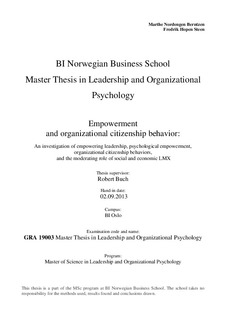Empowerment and organizational citizenship behavior : An investigation of empowering leadership, psychological empowerment, organizational citizenship behaviors, and the moderating role of social and economic LMX
Master thesis
Permanent lenke
http://hdl.handle.net/11250/2502706Utgivelsesdato
2013Metadata
Vis full innførselSamlinger
- Master of Science [1621]
Sammendrag
Research on empowerment has to date been inconsistent with respect to the logical structure of concepts, and research on the effectiveness of empowerment has provided mixed results. To address this issue, this study incorporates two different conceptualizations of empowerment. The researchers test the mediating role of psychological empowerment in the relationship between leadership empowerment behaviors and organizational citizenship behaviors directed towards the organization (OCB-O) and towards the supervisor (OCB-S). The moderating roles of social leader-member exchange (SLMX) and economic leader-member exchange (ELMX) on the relationship between psychological empowerment and OCBs are tested. A cross-sectional study with a time-lag is conducted among 192 employees from seven different organizations in Norway. The results show that leadership empowerment behaviors are positively related to OCB-O and OCB-S through psychological empowerment. Interestingly, and contrary to what was hypothesized, the moderation analyses revealed that ELMX accentuate and SLMX attenuate the relationship between psychological empowerment and OCB-O. This suggests that employees in low SLMX and high ELMX relationships engage the most in OCBs as a result of being psychologically empowered. Thus, psychological empowerment compensates for a lack of high SLMX and a presence of high ELMX. Finally, limitations of the study are discussed, and directions for future research and recommendations to practitioners are proposed.
Beskrivelse
Masteroppgave(MSc) in Master of Science in Leadership and Organizational Psychology - Handelshøyskolen BI, 2013
